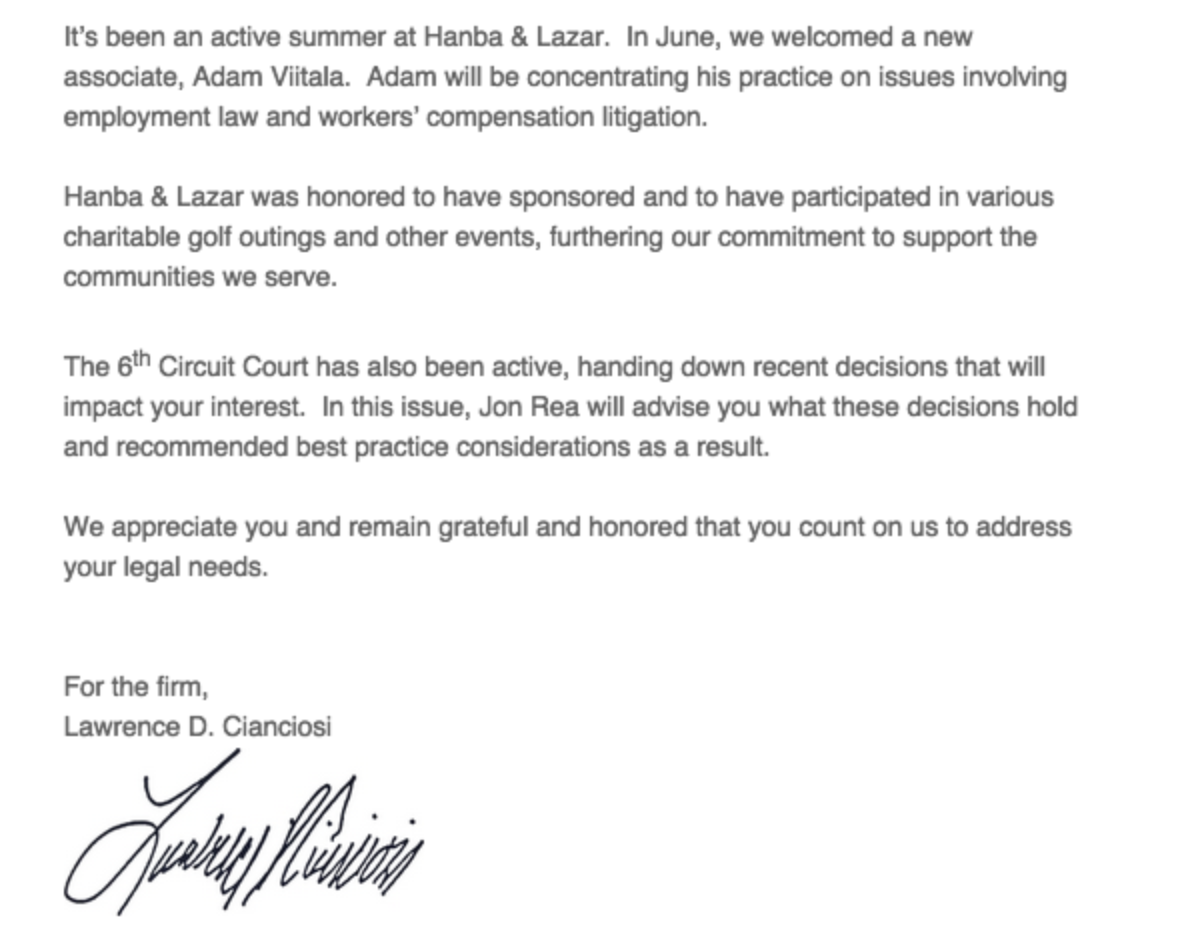15 Aug August 2015 HL Quarterly Update
A New Appointment and Reappointment to the MCAC
On June 19, 2015, Governor Rick Snyder announced the appointment of Rachel Lipinski and the reappointment of Garry Goolsby to the Michigan Compensation Appellate Commission. The nine-member commission is responsible for reviewing appeals decisions in cases that originated in the unemployment insurance benefits and workers’ compensation systems. Lipinski, who is replacing outgoing member Neal Young, was formerly consulting counsel to Assurant Health in Milwaukee. Goolsby, a graduate of the Cooley Law School, previously served on the Worker’s Compensation Board of Magistrates, and has been a part of the Michigan Compensation Appellate Commission since 2011. Both appointees will serve four-year terms beginning August 1, 2015 and expiring July 31, 2019, once their appointment is officially approved by the Michigan Senate.
Employee Broadly Defined Under the FLSA
Defendant Miri, a subcontractor, performed installation services, and hired Plaintiff Keller as a technician to install satellite-internet dishes. Defendant’s contractor paid them based on a fee schedule for specific tasks completed, and Defendant passed most of that fee on to its technicians. Plaintiff worked six days a week from 5:00 am to midnight, including installations, repairs, and travel between jobs. Defendant did not withhold federal payroll taxes from Plaintiff’s payments or provide Plaintiff with benefits.
In late 2012, Plaintiff stopped working for Defendant and filed a lawsuit, alleging that Defendant’s payment system violates the Federal Labor Standards Act (“FLSA”). The FLSA is the Federal law that establishes minimum wage, overtime pay, recordkeeping, and youth employment standards for employees in the private sector as well as in Federal, State, and local governments. Defendant responded by arguing Plaintiff was an independent contractor and therefore was not entitled to overtime compensation under the FLSA. The Federal district court agreed with Defendant and held that Plaintiff was an independent contractor, not an employee.
The 6th Circuit Court of Appeals took the case, Keller v. Miri Microsystems LLC, 781 F.3d 799, (6th Cir. Mich. 2015), and held that the relevant considerations under the FLSA’s extremely broad definition of “employee” are: (1) the permanency of the relationship between the parties; (2) the degree of skill required for the rendering of the services; (3) the worker’s investment in equipment or materials for the task; (4) the worker’s opportunity for profit or loss, depending upon his skill; (5) the degree of the alleged employer’s right to control the manner in which the work is performed, and; (6) whether the service rendered is an integral part of the alleged employer’s business. Ultimately, the Court held that there were disputes of material fact with regard to most of these six considerations, and the case should proceed to trial.
First Amendment Protects Religious Employer after Termination
Defendant InterVarsity Christian Fellowship is an organization whose purpose is to “establish and advance at colleges and universities witnessing communities of students and faculty who follow Jesus as Savior and Lord.” Further, Defendant openly stated their belief “in the sanctity of marriage”, and have made it clear that they wish married employees to remain so. Plaintiff Conlon began working for Defendant in 1986, and was married in 1988. From 2004 to 2011, her position included duties such as cultivating “intimacy with God and growth in Christ-like character through personal and corporate spiritual disciplines.”
In 2011, Plaintiff and her husband began to consider divorce, and as required by Defendant’s policy, Plaintiff informed her supervisor. Plaintiff was put on leave to attempt to repair her marriage, but when she requested a return to work, she was denied by her supervisors. Eventually, Plaintiff’s husband filed for divorce and she was terminated by. Plaintiff brought suit, alleging the Defendant had subjected her to discrimination made illegal by the Civil Rights Act of 1964. Defendant argued that its actions were protected under the “ministerial exception”, meaning that the First Amendment to the U.S. Constitution gives them the right to freely exercise their religion with regard to staffing their organization. For this exception to apply to Defendant’s actions, and thus bar an employment discrimination claim by Plaintiff, “the employer must be a religious institution and the employee must have been a ministerial employee.” The 6th Circuit Court of Appeals held that Defendant can clearly claim to be a religious institution. Interestingly, they also note a previous case that held a Methodist hospital was a religious institution. While there is no case law or statute that clearly defines a “ministerial employee”, the court looked to several different factors, and held that the Plaintiff’s job title and the purely religious aspects of her position qualified her as a ministerial employee. Further, the Court held that the ministerial exception is a structural limitation imposed by the Religion Clause of the First Amendment, and can’t be waived based on Defendant’s conduct. This case can be found at Conlon v. Intervarsity Christian Fellowship/USA, 777 F.3d 829 (6th Cir. Mich. 2015).
Curbing FMLA Abuse with Additional Examinations
What recourse does an employer have if they receive properly executed FMLA paperwork, then learn information that casts doubt on that employee’s true medical status? A sufficient FMLA medical certification stops an employer from requesting further information from the employee’s health care provider. However, when the employer has objective evidence that leads them to doubt the employee’s status, the employer can, at their own expense, pay for a second medical opinion. The employer can choose the physician providing the second opinion, and employees are required by the FMLA to authorize the release of pertinent medical records for such an evaluation.
If the employee receives a second opinion that differs from that of the original physician (who certified the employees FMLA leave initially), the employer may seek, once again at their own expense, a third opinion. However, this option is not without risk, as the conclusion of the third opinion physician is binding on the employer and employee. It is also worth noting that employers can seek re-certification of the employee’s medical status every thirty days. In this circumstance, both the employer and employee have to agree on the physician conducting the third examination.
Make Sure Drug/Alcohol Testing is ADA-Compliant
Employers should not forget that the ADA places limitations on the drug testing of employees. Employees, job applications with a history of substance abuse, and even current addicts are entitled to ADA protection. This protection is lost, however, when the substance abuse negatively affects the employee’s job performance, and employers can rightfully hold these individuals to the same job performance standards as non-addict employees. Further, the ADA’s accommodation requirement is not lost by addicts, as an employer may be required to allow addicts to do things such as take leave to seek treatment.
In a job interview, an employer can ask about current illegal drug use, but not about prior counseling or treatment. Employers may request that applicants undergo a drug test, with regard to illegal drugs only, before a job offer is extended. If the employer choses to do so, they should have all individuals applying for that position tested. If an employee notifies the employer they are using medication that may impair job performance, the employer must provide a reasonable accommodation if possible. And it’s worth remembering that employers can’t provide blanket rules prohibiting employees from using certain prescription medications.
An ideal workplace drug policy would state the following:
-Prohibits sale, use, distribution, manufacture, or possession of drugs, prescription drugs and paraphernalia
-Forbids employees from reporting to work under the influence
-Reserves the right to test for drugs and alcohol and specifically state under what circumstances
-Reserves the right to conduct searches of the workspace under reasonable suspicion
-States that prescription drugs are not to be abused or taken for any purpose other than for which they were prescribed
-Clearly outlines the drug and alcohol testing procedures
If you have any questions or concerns regarding your drug policy, feel free to contact Hanba Lazar at (810) 767 – 9400 or email jrea@hanbalazar.com.
The Ability Tour and Lansing Lugnut Outing Were a Success
Just a few weeks ago, Hanba Lazar hosted its annual Lansing Lugnut baseball game. The weather was perfect, the attendees enjoyed the newly-constructed centerfield suite, and as always, the post-game fireworks did not disappoint. Also, back in July, Peckham once again put on a fantastic Ability Tour, with the help of some riders from Hanba Lazar. A great deal of money was raised and a lot of miles were logged on our bikes. Unfortunately, not everyone made it through their ride before the storm rolled in.





Sorry, the comment form is closed at this time.